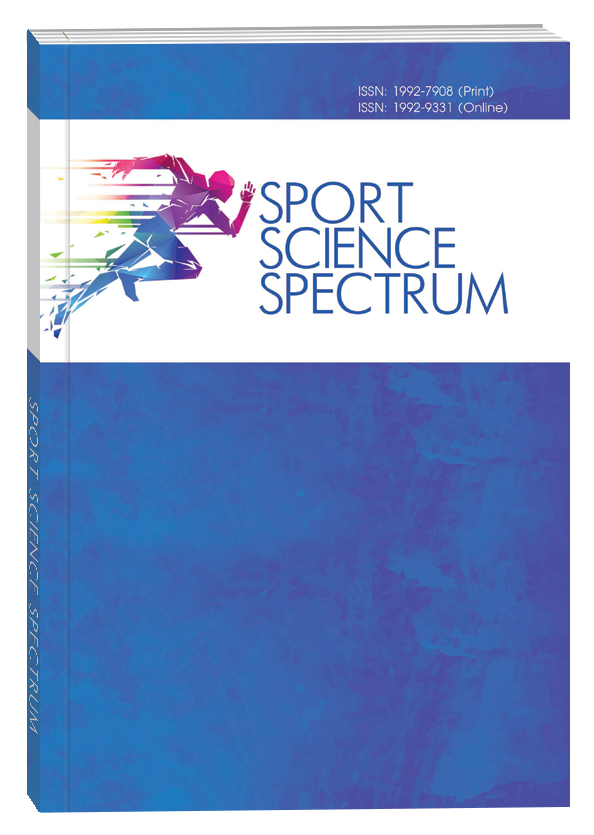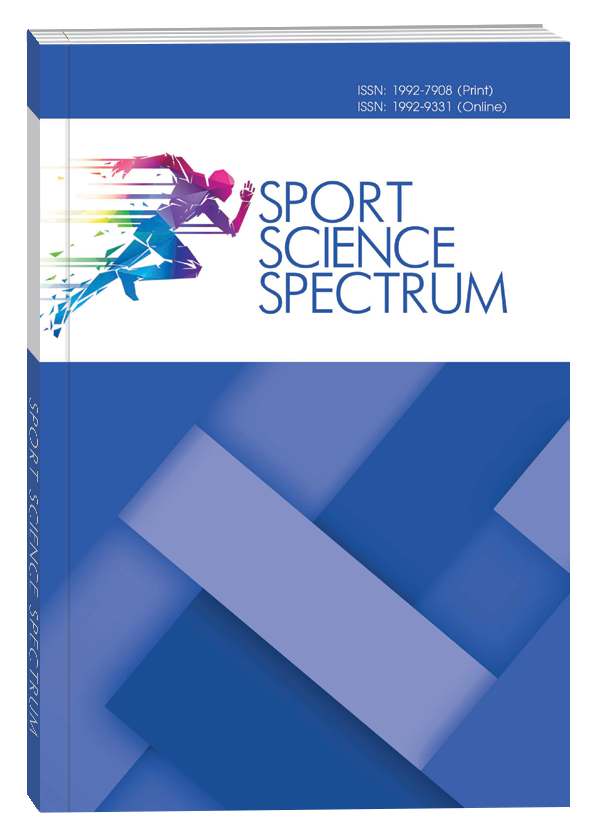THEORETICAL ASPECTS OF ROWERS’ MOTIVATION FORMATION IN ROWING AND CANOEING
DOI:
https://doi.org/10.32782/spectrum/2025-2-9Keywords:
athlete’s motivational sphere, psychological training, specialized basic training, psychological burnout, mental resilience, motivational mechanisms, athletes’ stress resistanceAbstract
A comprehensive analysis of motivational mechanisms in sports, particularly in rowing, has been conducted. The study examines key theoretical models, motivation formation methods, and their practical applications. Special attention is given to the stage of specialized basic training, where long-term motivation is developed. The role of cognitive and behavioral strategies in maintaining motivation, as well as the use of mindfulness techniques, visualization, and motivational immersion, is highlighted. The influence of psychological, pedagogical, and biomechanical factors on motivation levels is explored. The study focuses on mental resilience, stress, motivation, cognitive strategies, and other psychological aspects affecting rowers’ performance.The article highlights the interrelation between psychological, pedagogical, and biomechanical factors and motivation levels, emphasizing the importance of mental resilience, stress management, and cognitive strategies in achieving stable athletic performance. Objective. The aim of the study is to analyze the mechanisms of formation and maintenance of motivation in rowers during the stage of specialized basic training. The analysis covers psychological factors (self-regulation, attitudes, needs), social influences (coach, team, family, sports environment), and individual-typological characteristics of the athletes (temperament, character, stress resistance).Methodology. The research is based on the integration of cognitive-behavioral and humanistic theories of motivation, the self-determination theory, and the biopsychosocial approach to sports activities. Results. It has been established that rowers’ motivation is influenced by both internal (individual personality traits, self-regulation, mindfulness) and external factors (social support, coaching style, reinforcement system). The effectiveness of cognitive strategies, visualization techniques, and motivational immersion in enhancing stress resilience and strengthening long-term motivation has been proven. The study reveals that a combination of intrinsic and extrinsic motivation contributes to stable athletic performance, whereas an imbalance may lead to psychological burnout.Conclusions. The study identifies the need for further research on adapting motivational theories to specific sports disciplines and developing personalized motivation support methods in rowing. It is recommended to implement personalized motivational support strategies, utilize modern psychological support techniques for athletes, and further investigate the adaptation of motivational theories to the specifics of different sports disciplines.
References
1. Білоус О.В. Психологічні особливості мотивації спортсменів-веслувальників. Спортивна наука України. 2018. № 4. С. 13–19.
2. Гончаренко Н.І. Формування мотивації досягнення у веслувальників на етапі спеціалізованої базової підготовки. Педагогіка, психологія та медико-біологічні проблеми фізичного виховання і спорту. 2019. № 2(23). С. 45–50.
3. Демченко С.М. Вплив мотиваційних установок на результативність змагальної діяльності веслувальників. Молодий вчений. 2020. № 3(75). С. 21–25.
4. Дяченко А.Ю., Шкребтій Ю.М., Цзя Г. Специфічні характеристики функціонального забезпечення спеціальної працездатності веслувальників на байдарках і каное. Фізична культура, спорт та здоров’я нації. 2017. № 2(8). С. 45–50.
5. Ковальчук Т.В. Психологічні чинники мотивації спортсменів у веслуванні на байдарках і каное. Вісник ЧНПУ ім. Т.Г. Шевченка. 2017. № 146. С. 98–102.
6. Сидоренко О.П. Мотивація спортивної діяльності веслувальників: теоретичний аспект. Фізичне виховання, спорт і культура здоров’я у сучасному суспільстві. 2016. № 2(34). С. 123–127.
7. Шинкарук О.А. Мотивація спортсменів у циклічних видах спорту: теоретико-методичні аспекти. Спортивний вісник Придніпров’я. 2017. № 1. С. 34–39.
8. Шинкарук О.А. Психологічні аспекти підготовки спортсменів високої кваліфікації. Науковий часопис НУФВСУ. 2019. № 3. С. 22–28.
9. Шинкарук О.А. Формування мотиваційної стійкості у спортсменів: теоретичні та практичні аспекти. Фізичне виховання, спорт і культура здоров’я у сучасному суспільстві. 2020. № 1(49). С. 15–20.
10. Bandura A. Self-efficacy: The exercise of control. New York: W.H. Freeman, 1997. 604 p.
11. Deci E.L., Ryan R.M. Self-determination theory and the facilitation of intrinsic motivation, social development, and well-being. American Psychologist. 2000. Vol. 55, № 1. P. 68–78.
12. Engel G. L. The clinical application of the biopsychosocial model. American Journal of Psychiatry. 1980. Vol. 137. № 5. P. 535–544.
13. Hardy L.A catastrophe model of anxiety and performance. British Journal of Psychology. 1990; 81(2): 163–178.
14. Hardy L. Development of a catastrophe model of anxiety and performance. Journal of Sport & Exercise Psychology. 1996; 18(4): 363–384.
15. Isoard-Gautheur S. Burnout in elite young athletes: A self-determination perspective. British Journal of Sports Medicine. 2013; 47(11): 701–705. https://doi.org/10.1136/bjsports-2012-091767
16. Lemyre P.N., Roberts G.C., Stray-Gundersen J. Motivation, overtraining, and burnout: Can self-determined motivation predict overtraining and burn- out? European Journal of Sport Science. 2007; 7(2): 92–101. https://doi.org/10.1080/17461390701302607
17. Mageau G.A., Vallerand R.J. The coach–athlete relationship: A motivational model. Journal of Sports Sciences. 2003; 21(11): 883–904.
18. Maslow A.H. Motivation and personality. New York: Harper & Row; 1954.
19. McClelland D.C. The Achieving Society. Princeton, NJ: Van Nostrand; 1961.
20. Mallett C.J., Hanrahan S.J. The influence of motivational climate, perceived competence, and goal orientation on pre-competitive anxiety and perfor- mance. Journal of Sport Psychology. 2004; 26(4): 623–641.
21. Munroe-Chandler K.J. The role of mental imagery in sport performance: A systematic review. International Review of Sport and Exercise Psychology. 2012; 5(1): 1–30.
22. Pelletier L.G. The relationship between self-determined motivation and persistence in a real-life setting. Journal of Sport & Exercise Psychology. 2004; 31(11): 1486–1514.
23. Ryan R.M., Deci E.L. Intrinsic motivation and self-determination in human behavior. New York: Springer Science & Business Media; 2017.
24. Vansteenkiste M. Intrinsic motivation, flexibility, persistence, and performance: Self-determination theory and sport. In: Tischer Z. (ed.). Encyclopedia of Sport Psychology. Thousand Oaks, CA: Sage Publications; 2014. p. 1–4.
25. Vallerand R.J., Rousseau F.L. Intrinsic and extrinsic motivation in sport and physical activity: A review and a look at the future. In: Roberts G. C. (ed.). Motivation in Sport and Exercise. Champaign, IL: Human Kinetics; 2001. p. 389–415.
26. Vealey R. S. Conceptualization of sport-confidence and competitive orientation: Preliminary investigation and instrument development. Journal of Sport Psychology. 1986; 8(3): 221–246.





